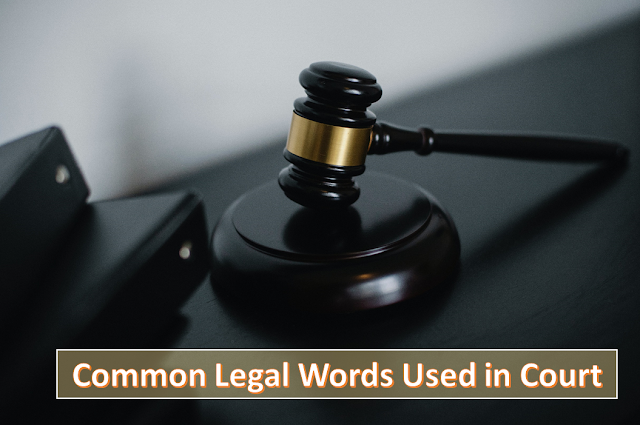Common Legal Words Used in Court
Are you a lawyer, prosecutor, or judge? Do you work on many contracts in your office? Perhaps you are planning to buy or rent a property abroad?
It's hard to evade legal language at work and in life.
Learning legal terms in English can make your job much easier, take the pressure off important documents, and even expand your career options internationally.
In this article, you will learn the most essential legal terms in English for courts, crimes, property law, and contracts.
Knowing legal terminology in English is essential if you desire to study or work in law overseas, or if you intend to practice international law.
You will need it in meetings, negotiations, in the courtroom, in discussing legal contracts, and so on.
In addition, people who do business with English-speaking companies around the world and even in their own countries must also be familiar with legal English for contracts.
Here are the most important legal terms in English:
- Attorney/Lawyer
- Case
- Contract
- Court
- Defendant
- Evidence
- Guilty
- Judge
- Jury
- Lawsuit
- Plead
- Prosecutor
- Sentence
- Solicitor
- Sue sued
- Trial
- Verdict
- Bail
Legal Terminology in English in the Courtroom
- Accuse: Accusing someone is the statement that that person has committed a crime.
- Advocate: A legal advisor or lawyer who defends the accused before a court.
- Arrest: To take someone who has supposedly done something illegal into police custody.
- Capital punishment/Death penalty: When the guilty person is sentenced to death.
- Charge: To formally charge someone with a crime.
- Case: A legal case – something that must be decided in court
- Civil law: A law that is not criminal law.
- Convict: A person who has been convicted of a crime and is serving a prison sentence.
- Criminal law: which punishes criminals and those who break the law.
- Defense Attorney: The attorney who defends the accused.
- Witness: Testify in the courtroom for or against the accused.
- Testimony: Testimony of a written or spoken statement of the crime or offense
- Warrant: An official document ordering the police to arrest someone.
- Witness: The person who saw the crime at the moment it occurred and must describe what he saw or heard in the courtroom.
- Forgery: Presenting a forged image of a signature, document, money, or artwork.
- Fraud: Scam phishing to make money.
- Kidnapping: Moving, or detaining a person somewhere against their will.
- Murder: This is the deliberate killing of a person.
- Perjury: After taking a solemn oath, to tell the truth.
- Robbery: The act of stealing from someone or somewhere.
- Shoplifting: This is the theft of items from a shop or shop.
- Trespass: To go to a place where you are not allowed to go.
- Vandalism: The willful destruction of property.
- English legal terms for property
- Landlord: Owner of rental property.
- Lease: A formal contract that allows someone other than the owner to use a property for a certain period in exchange for a certain amount of money.
- Loan: Money borrowed from a bank or private institution that must be repaid with interest.
- Mortgage: A legal agreement from a bank that lends you money to buy a home.
- Rental Agreement: A real estate lease contract without a specific period.
- Security Deposit: A payment you make when renting a property to cover any possible damages that may occur.
- Tenant: The person who rents the property.
English Legal Terms in Contracts
- Agreement: A negotiated or legal understanding between two or more groups of people.
- Article: A section clause in the contract.
- Default: Failure to make loan or mortgage payments.
- Hereinafter: This is a term used in contracts meaning, “more in the document”.
- Liable: legally responsible for something.
These words are a great start to improving and building legal terminology in the English language, take time to get to know and practice these words and you will feel more confident when speaking in English.

